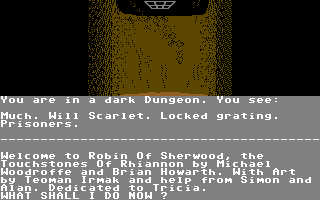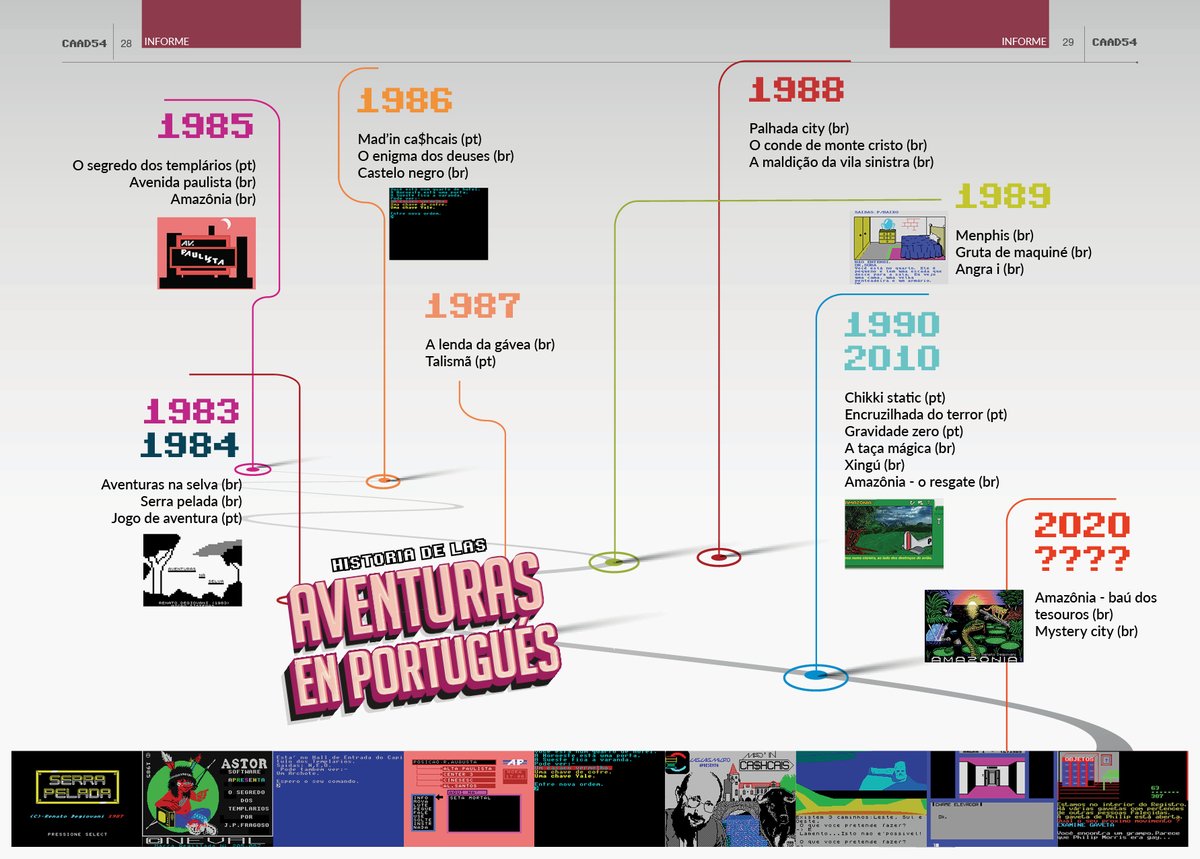I just stumbled upon this one yesterday when researching old text adventures and I must share it, it's absolutely amazing!
It's a free to download, 10-part PDF series created by Mark James Hardisty from the UK between 2018-2021, focusing on less known classic text adventures. It's universally acknowledged that Infocom were the undisputed kings of the genre, then much fewer people are aware of Legend Entertainment (founded by two veteran ex-Infocom employees) and Magnetic Scrolls (the "UK Infocom", more or less). Perhaps a few have even heard about Level 9 (they were famous in the 8-bit era in Europe), but what of the rest? This was an extremely popular genre until about 1985; Gamebase64 and World of Spectrum alone lists over 4000 (!) text adventures (surely a significant percentage of those are conversions, but still an enourmous number). Let's say you want to try out a few 8-bit classics, and supposing only 3% of them are worth checking out, that's around 120 titles, so how would you even find them? (In reality, I think there are a lot more than that.)
The sad fact is that text adventures have been treated as the neglected ugly stepchildren of computer games since the late 80s. It's very hard to search for information about these lesser known adventures online, apart from scouring through magazine scans -- a time consuming endeavour. Yes, there is the Interactive Fiction Database, but most of the folks over there seem to be enamored with the text equivalent of walking simulators ("interactive fiction"); old-school "verb noun" parsers and devious puzzles are often frowned upon in those realms. Then the people of AdventureGamers and JustAdventure wouldn't even recognise a good point-and-click graphic adventure if it hit them with a rubber-chicken-with-a-pulley-in-the-middle on the forehead as of late...
That is precisely why this British gentleman's work is invaluable; apart from interviewing legendary figures of the British text adventure scene from the 80s, he also asked each of them to name five of their favourite adventure games! Plus there's also listings of the best games of each studio he covers in the series. Most parts also showcase one modern (but 100% old-school in spirit!) text adventure along with an interview with its creator. Very, very cool stuff, indeed!
Anyway, enough of me babbling; if you have even just the remotest interest in text adventures, you owe it to yourself to check out this magnificent series!
http://classicadventurer.co.uk




It's a free to download, 10-part PDF series created by Mark James Hardisty from the UK between 2018-2021, focusing on less known classic text adventures. It's universally acknowledged that Infocom were the undisputed kings of the genre, then much fewer people are aware of Legend Entertainment (founded by two veteran ex-Infocom employees) and Magnetic Scrolls (the "UK Infocom", more or less). Perhaps a few have even heard about Level 9 (they were famous in the 8-bit era in Europe), but what of the rest? This was an extremely popular genre until about 1985; Gamebase64 and World of Spectrum alone lists over 4000 (!) text adventures (surely a significant percentage of those are conversions, but still an enourmous number). Let's say you want to try out a few 8-bit classics, and supposing only 3% of them are worth checking out, that's around 120 titles, so how would you even find them? (In reality, I think there are a lot more than that.)
The sad fact is that text adventures have been treated as the neglected ugly stepchildren of computer games since the late 80s. It's very hard to search for information about these lesser known adventures online, apart from scouring through magazine scans -- a time consuming endeavour. Yes, there is the Interactive Fiction Database, but most of the folks over there seem to be enamored with the text equivalent of walking simulators ("interactive fiction"); old-school "verb noun" parsers and devious puzzles are often frowned upon in those realms. Then the people of AdventureGamers and JustAdventure wouldn't even recognise a good point-and-click graphic adventure if it hit them with a rubber-chicken-with-a-pulley-in-the-middle on the forehead as of late...
That is precisely why this British gentleman's work is invaluable; apart from interviewing legendary figures of the British text adventure scene from the 80s, he also asked each of them to name five of their favourite adventure games! Plus there's also listings of the best games of each studio he covers in the series. Most parts also showcase one modern (but 100% old-school in spirit!) text adventure along with an interview with its creator. Very, very cool stuff, indeed!
Anyway, enough of me babbling; if you have even just the remotest interest in text adventures, you owe it to yourself to check out this magnificent series!
http://classicadventurer.co.uk
The Classic Adventurer is a bookazine dedicated to the golden era of text adventures.
With a visually stunning design, it contains meticulously researched articles with some of the biggest games in the genre.
Containing in-depth interviews with industry legends including Anita Sinclair, Hugh Steers, Charles Cecil MBE, Fergus McNeill, Tim Gilberts, Mike White, John Wilson, Veronika Megler, Trevor Lever and Peter Jones, Scott Adams and The Austin Brothers.
Take a look behind the scenes at some of the greatest ever text adventure games, including The Pawn, The Big Sleaze, Fish!, Doomsday Lost Echoes, The Hobbit, Hampstead and Twin Kingdom Valley.
The magazine features a raft of adventure artwork (lovingly restored by hand), articles, features and book reviews.



















